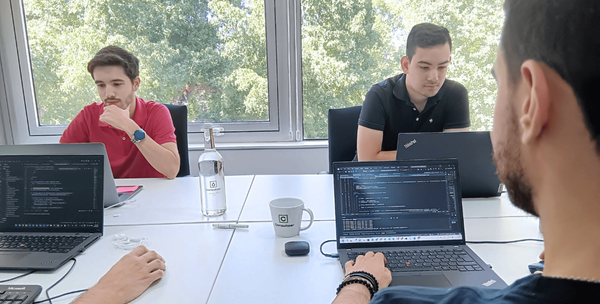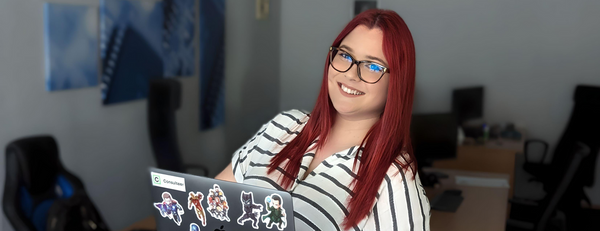AI is all around us

When was the last time your smartphone autocorrected a word you wrote wrong? Well, that was also a time when you used Artificial Intelligence (AI).
Although the first things that come to our minds when we hear about AI are usually flying cars or human-like robots, we are often unaware that AI is all around us and we're using it in our everyday lives.
AI will definitely have a more significant impact on our lives in the future, but it's already highly integrated even now. Before we get to the AI examples from our everyday lives, let's see a short introduction to AI and what it really is.
What is Artificial Intelligence (AI)?
AI represents the ability of computers to perform tasks that usually require human intelligence. This means that AI algorithms are able to learn, recognize video and audio elements, make decisions, and translate languages. The most important technologies based on AI are:
Machine learning is one area of Artificial Intelligence that uses data and algorithms to mimic the way people learn, intending to improve precision steadily.
Natural Language Processing (NLP) is the capacity of a computer software to interpret natural language as it is spoken and written.
Deep learning seeks to emulate the human brain, allowing algorithms to cluster data and generate extremely accurate predictions.
Today, AI is used to propose what you should purchase next on the internet, recognize people or objects in a photo, or detect financial fraud. Let's see some more examples.
Artificial Intelligence examples we use in our everyday lives
Personal assistants
As we already mentioned, AI has the ability to recognize natural speech. This means that AI can listen and interpret what you're saying to your personal assistants. Here are the most popular ones today:
Siri can help you get the best user experience when using some of Apple's products, like MacBook, iPhone, iPad, or Apple Watch. You may also ask her whatever questions you want and have her carry out various orders for you. Siri has access to all of your phone's apps and can assist you in searching a certain location or information, making phone calls, and sending messages.
Cortana is designed for Microsoft Windows phones and delivers customized recommendations based on the data contained in a user's smartphone.
Alexa is Amazon's personal assistant capable of doing voice interactions, playing music, setting alarms, streaming audiobooks, and providing real-time information. It is also often used to control an intelligent home system.
Finance
Financial companies use AI-based tools to predict financial market trends based on past data, enabled by computers and data scientists.
Machines excel at this because they can process a large volume of data in a short period. They are also good at recognizing patterns in historical data and forecasting how they will reoccur in the future.
Financial institutions use AI to improve their stock exchange performance and increase profits, especially now, when trading has become an everyday thing.
There are also other AI-based tools meant for personal use, mainly with the goal of tracking personal finance. For example, Cleo is a messenger-based financial assistant powered by AI that assists users in managing their finances.
Another example is Olivia, a financial assistant software that utilizes artificial intelligence and behavioral economics to help you manage your money. Basically, this program looks for trends in how people spend their money and leverages them to develop solutions to help people spend less on the same products while still saving money.
Travel
Travel has vastly improved thanks to AI. Instead of relying on paper maps or guidance, you may now input your location into Google or Apple Maps on your phone.
The algorithms employ machine learning to recall the outlines of the structures they've learned, allowing for improved map visualizations and detection and comprehension of street numbers. The software has also been taught to recognize and interpret changes in traffic flow so that it may offer a path that avoids traffic jams.
Moreover, thanks to AI, you can now avoid travel agencies. They have been replaced by AI assistants and intelligent chatbots, allowing passengers to book flights, hotels, and car rentals online. These chatbots are used on social media platforms such as Facebook Messenger, Skype, WhatsApp, and Viber to provide a more customized booking experience for users.
Healthcare
Artificial Intelligence is revolutionizing existing healthcare systems through technologies that can anticipate, grasp, adapt, and respond in order to identify new relationships between genetic codes or to control surgery-assisting robots.
For example, by building AI-powered healthcare solutions, Viz.ai assists care teams in reacting quicker. The company's AI technologies can instantly detect problems and alert care teams, allowing doctors to explore choices, make quicker treatment decisions, and potentially save lives.
AI might have a significant influence on healthcare in the future, assisting radiologists in detecting cancers in x-rays, researchers in detecting disease-related genetic sequences, and discovering chemicals that could lead to more effective treatments.
The recent accomplishment by Google's AlphaFold 2 machine learning algorithm is projected to cut months from the time it takes to create new medications to hours.
Social media
Through keyword identification and visual picture recognition, AI systems can quickly identify and remove problematic content that breaks terms & conditions.
Moreover, as social media platforms recognize that their users are their product, they employ Artificial Intelligence to connect them with advertisers and marketers who have recognized their profiles as significant targets.
Social media AI may also recognize the type of posts that a user enjoys and recommend similar content to them.
Will AI steal our jobs?
It seems like many people fear that AI will steal our jobs and robots will take over the world. Well, things won't really go like in dystopian movies.
While AI is unlikely to replace all employment, it is clear that it will transform the way we perform work tasks. The only debate is how quickly and deeply automation will impact the workplace. The goal is to eliminate repetitive activities by automating them and having more time to focus on creative challenges.
Human. Technology. Together.
next - stories


